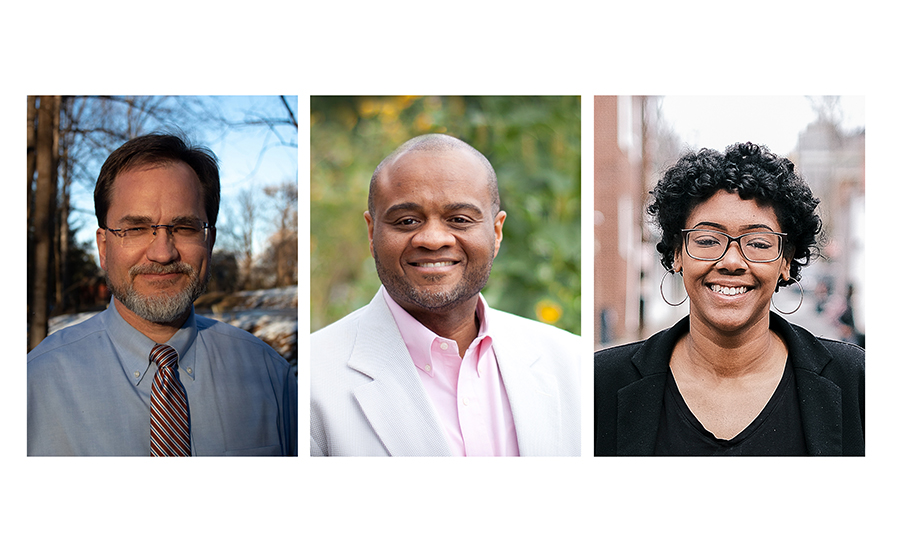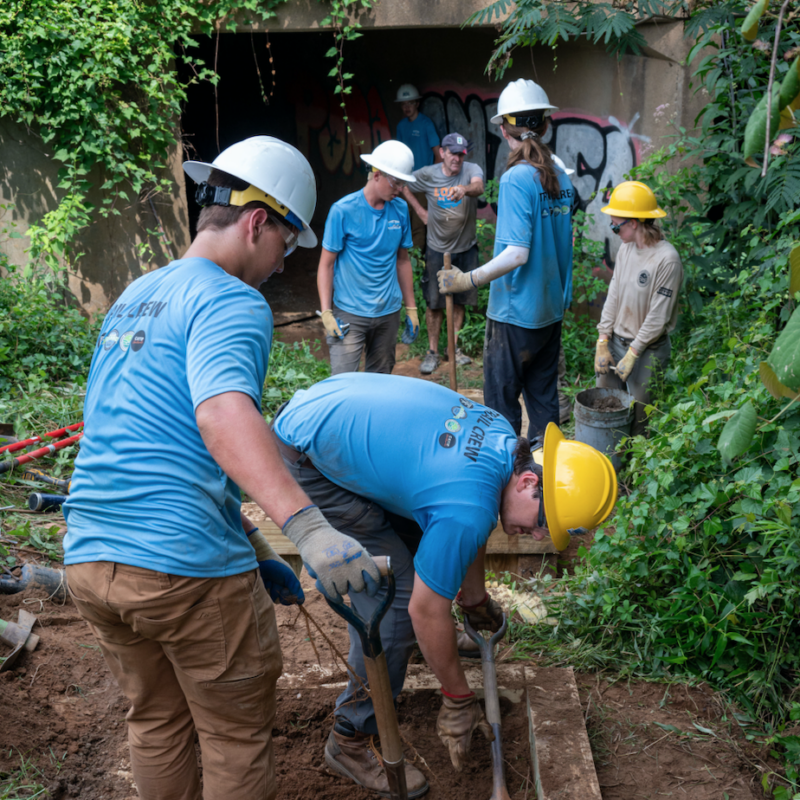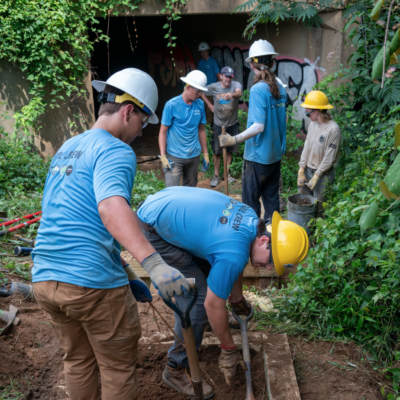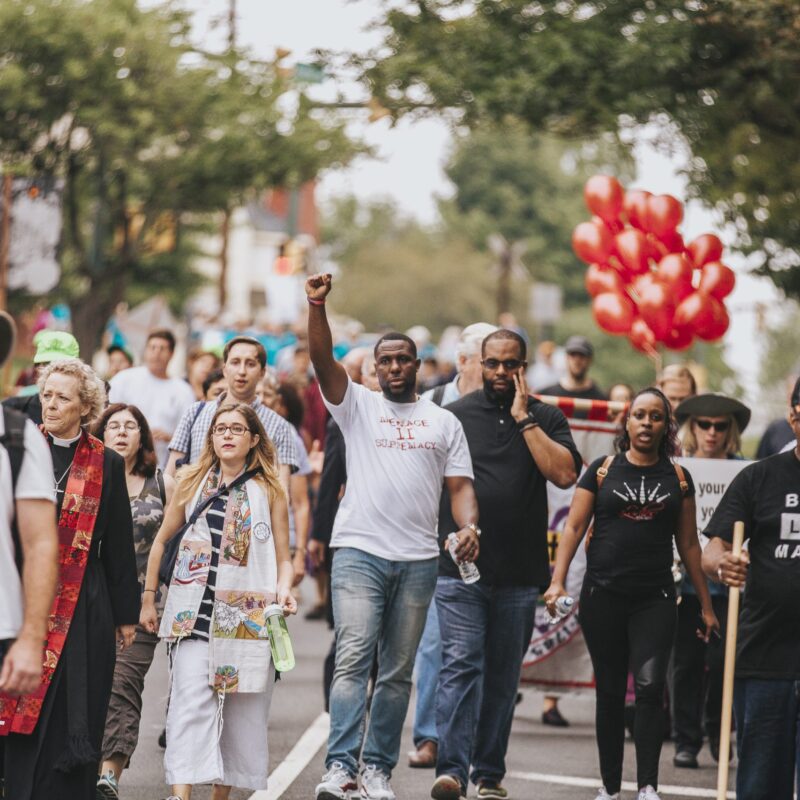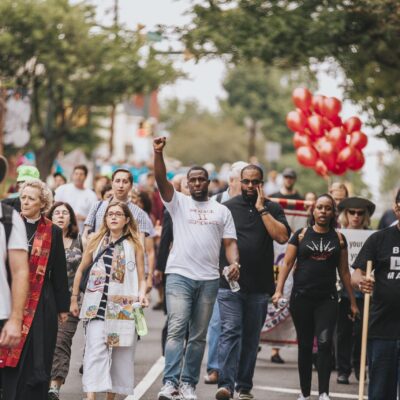City Councilor Heather Hill and Mayor Nikuyah Walker’s terms expire at the end of the year, and four candidates have thus far declared their intention to win those seats. Earlier this month, social entrepreneur Carl Brown announced his bid for City Council, joining Charlottesville School Board member Jaundiego Wade, UVA project manager Brian Pinkston, and entrepreneur Yas Washington in the race. Walker is running for reelection, and Hill has not made an announcement either way. The candidates will compete for two Democratic nominations this summer, and the two winners will run with Walker, an independent, for the open council seats in the fall.
On Wednesday evening, the Fry’s Spring Neighborhood Association hosted a virtual forum for the four new candidates. The panel was the first event at which the whole group appeared together in the same place, and the candidates shared how they plan to address a range of pressing issues, from the affordable housing crisis to dysfunction inside City Hall.
During his opening remarks, Brown, who was born and raised in Charlottesville, emphasized his deep roots in the community and leadership within local organizations, allowing him to have a “good understanding” of the city’s needs.
Pinkston, who unsuccessfully ran for council in 2019, highlighted the collaborative skills he’s gained from his 17 years in project management, while Wade pointed to his 16 years serving on the school board, and his 20 years working as a transportation planner for Albemarle County.
Just 23 years old, Washington touted her campaign work for Albemarle County Commonwealth’s Attorney Jim Hingeley and 5th Congressional District candidate Dr. Cameron Webb. She’s also served as a youth counselor, and founded her own communications business, Rocket Science Integrated.
On the topic of affordable housing, Wade said there needs to be more collaboration—and compromise—between the city, developers, and neighborhood associations.
Brown argued that neighborhood associations should have more control over development plans.
“I just don’t feel like we should be making those determinations from our standpoint to say this is going to go in this neighborhood, [particularly] when they run that neighborhood,” he said. “We need to see more representation from the neighborhood standpoint…and then we can go from there.”
Washington discussed the various challenges that come with R-1 zoning, which limits development to one unit per lot. Other zoning categories, like R-1B, are needed to build affordable housing, she said.
Forum moderator Jason Halbert later asked the candidates how they would put a stop to the high turnover in city leadership, and frequent clashes between councilors since the 2017 Unite the Right rally.
Washington said she would focus on building a strong council and City Hall, in order to properly support the city manager. Wade promised to bring calm and consistent leadership.
I think just bringing two people off of [council] is going to change the chemistry and dynamic of the entire board, and give us an opportunity to start from scratch.
Carl Brown, City Council Candidate
“I think just bringing two people off of [council] is going to change the chemistry and dynamic of the entire board, and give us an opportunity to start from scratch,” said Brown.
“I wouldn’t say that I’m buddies with Michael [Payne], Sena [Magill], or Lloyd [Snook], but I know I can work with them,” echoed Pinkston.
The candidates also discussed the Capital Improvement Program, the city’s five-year budget for large infrastructure projects. Halbert mentioned that in Fry’s Spring, residents have long advocated for improved pedestrian and bicycle safety on Stribling Avenue—the future site of a controversial 170-unit development—but council has yet to address the problem. Around town, other neighborhoods have similar issues, as a growing Charlottesville juggles development, transportation, and other concerns.
“The issue that I see with the [Capital Improvement Program] is that large priorities come up every couple of years,” said Pinkston. “What I would do is that I would sit down with the city manager, [and] make a point that, yes, we need to fund these large things, [but] we also need to make sure this backlog of things like sidewalks doesn’t fall off the radar.”
Drawing from his background in transportation, Wade pointed to the variety of funding options available for small-scale infrastructure projects.
“There’s always some type of safety grant,” said Wade. “And now with UVA’s new positioning on being more friendly to the neighborhoods, I would go to UVA [and] say, ‘Hey! This is a $20,000 project—is this something that you can do?’”
Washington suggested such projects could be funded by the $500,000 already included in the city’s operating budget for sidewalks.
The Capital Improvement Program also currently sets aside $50 million for school reconfiguration, a low estimate for the project’s current price tag. All four candidates recommended the city consider additional funding options for the massive project.
“We need to think about community partners, a foundation, ways of raising money,” said Pinkston. “That might be the sort of thing where we issue a bond referendum.”
The candidates were divided when it came to raising taxes. Washington supports potentially increasing the property tax rate, hoping the money will be used to help better fund public works projects. Wade and Pinkston, meanwhile, said they would be very hesitant to raise taxes.
Brown expressed concern about rising property assessments—a consequence of gentrification.
“I think homes should be taxed at an individual rate for what they were purchased for, or what their value was at that point in time, and not for the entire scope of every home in that area,” said Brown. “We need to come up with some way where we’re not putting people in a bind, where they are having to give up their properties because of what’s built around them.”
The Democratic primary will be held on June 8.
Correction 3/17: The original version of this story suggested that the city planned to raise the property tax rate in next year’s budget, but it does not.
